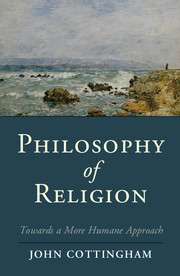8 - Conclusion: Humane Philosophizing about Religion
Published online by Cambridge University Press: 05 September 2014
Summary
Do you see yon wicket gate?
John BunyanTo bring our discussion to a close, let us draw together some of the threads of the last chapter and indeed of the book as a whole. Ancient religious imagery, going right back to the Gospels, speaks of the road to salvation as a journey that has to be entered upon by first passing through a gate – the ‘wicket gate’, as it appears in John Bunyan's famous seventeenth-century allegory, The Pilgrim's Progress. In Christian symbolism, of course, Christ himself is the gate, or ‘door’ (thura) to salvation: the entrance the flock must pass through to find ‘pasture’ (John 10:9). Like many symbols, the gate image contains many layers of meaning. But the idea of a transition that needs to be made, or a change that needs to be undergone, in order for certain possibilities to become actual turns out to be a linking thread that ties together many of the themes in this book.
We began by suggesting that the special nature of religious understanding requires a certain methodology if it is to be approached in a philosophically appropriate way. An epistemology of detachment, so far from being the paradigm of proper philosophizing that it is often supposed to be, may be a way of hardening oneself against the porousness and receptivity that is a necessary condition for certain kinds of evidence to become salient (Chapter 1). As we have just seen in Chapter 7, the disciplines of spiritual praxis can be interpreted as a training process that facilitates just the kind of interior moral transformation that will generate the required receptivity, as envisaged in the conversion process as traditionally understood.
- Type
- Chapter
- Information
- Philosophy of ReligionTowards a More Humane Approach, pp. 169 - 176Publisher: Cambridge University PressPrint publication year: 2014

